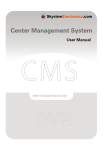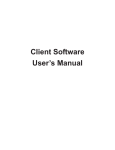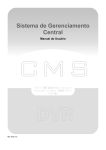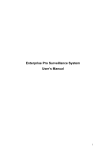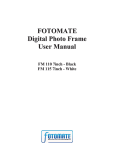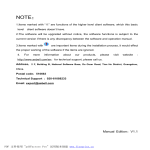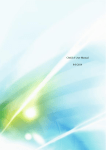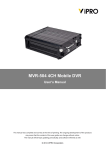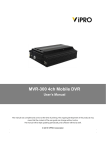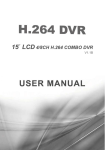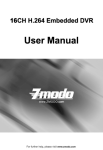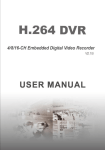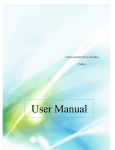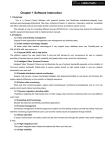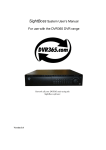Download CMS user manual
Transcript
CMS 4/8/16 CH Digital Video Recorder Contents 1.0 CMS FUNCTIONS .....................................................................................2 2.0 INSTALL CMS............................................................................................2 3.0 START CMS...............................................................................................4 3.1. Top Toolbar .............................................................................................................5 3.2 Top Menu Bar ..........................................................................................................5 3.3 Toolbar on Right Side ..............................................................................................6 3.4 Video Area................................................................................................................6 3.5 Bottom Toolbar ........................................................................................................7 4.0 MENU AND MOUSE OPERATION ............................................................8 4.1 File ...........................................................................................................................8 4.2 Tools.........................................................................................................................8 4.3 Help........................................................................................................................18 4.4 Mouse Operation....................................................................................................18 5.0 REAL-TIME VIDEO DISPLAY AND CONTROL .......................................19 5.1 Real-Time Video Frame Control............................................................................19 5.1.1 Displaying Mode Switching ............................................................................19 5.1.2 Display Control ...............................................................................................20 5.2 Pan/Tilt/Zoom Controlling.....................................................................................20 5.3 Device Information ................................................................................................21 1 Center Management System (CMS) is an integrated network monitoring manage software, which can run independently and manage several digital video recorder, monitor video, capture, record, playback, download setup parameters and control pan/tilt, etc. It is applicable management platform for medium and relatively large network video monitoring. 1.0 CMS Functions This CMS can mainly realize following functions: Real-time video display: it can display real-time video images of 1-64 channels one page within monitoring network. It can realize single frame, 4-frame, 9-frame, 16-frame partition display, 64-frame partition display. Also it can support multiwindow full screen and single window full screen display. Pan/tilt controlling: within authorized range, the orientation, pitching angle and focus of the camera can be changed by the control of front end pan/tilt and lens Remote Video Recording: video file can be stored in build-in hard disk of DVRs by setting recording time.. Local video recording: Videos can be record in CMS at any time you start up local recording. Real-time video image capture: it is auxiliary function for real-time monitoring. It will save the single frame from dynamic images in BMP format, and it can capture images during monitoring or playback. Audio monitoring: CMS-side can monitor the audio of front-end device. Local playback: video files of devices at any time in the recording can be retrieved and replayed. Remote playback: to retrieve, replay and download the recording files in front-end device or other recording files in CMS. Remote setting: Set up parameters at CMS-side. 2.0 Install CMS ƾ Operating Environment: Operating system: Windows XPˈWin 7 Network protocol: TCP/IP CPU: P4/3.0G RAM Requirements: 2.0G (We recommend using 2.0 G and the RAM should be 2 above 1.0G for normally running) Network Card; 100/1000M Graphics Card: It should support hard ware zoom (such as: ATI, TNT2 PRO). We recommend you use graphic card above ATI9800 and video memory above 128M ƾ Installation Guide: ƾ Open folders of management software and run (double click left button of the mouse) “AT_DvrCmsSetupv125.exe”, and then the following dialogue box will appear as first Fig shows and click “Next” , there will be dialog show as second Fig. Next, select the destination folder to save the install file and follow the prompt of installation tool until the appearance of the step displayed as following. Click [Finish] to complete the installation. 3 3.0 Start CMS Choose the software in [Start] menu---program _DVR-----AT_Dvrcms-----AT_Dvrcms, which is showed as following: groups-----AT- Run CMS by clicking the left button of the mouse, and dialogue box as following will appear: 4 3.1. Top Toolbar You can manually choose different icons as following picture: ǏDEV MANAGEǐ: After clicking this icon, you can add project, area and device. When you add device, you should set device name, fill in IP address, port, username and password. ǏPLAYBACKǐ:After entering, you can select device and defined period to retrieve recorder video files in remote and playback the files. ǏLOCAL SETUPǐ: After entering, you can set your record path, capture path and file path. ǏREMOTE SETUPǐ:Click this icon to enter into setup interface, this interface include encode, record, device alarm, channel alarm, PTZ setting, network, mobile, Email, user management, system setting, HDD management and version information. ǏEXIT SYSTEMǐ: Click this icon to exit system. 3.2 Top Menu Bar In top menu bar, there are three menu items such as File, Tools and Help. They include the main functions of setting, playback and manipulation in this software. It’s showed as follows: 5 3.3 Toolbar on Right Side There are two tabs on right side. The first one displays device information. You can get project, area and device information from this tab. You can spread out it by left-clicking it, choose one channel and drag it to video area to monitor this channel. If the channel is being monitoring, the icon turn to green as . If it is disconnected, the icon will be grey. The second tab is Pan/tilt control button. You can control high speed dome. 3.4 Video Area Choose the real-time video of one channel in video display area, and click right button 6 on selected video screen. System pops up a menu as follows: According to the menu, operations can be done such as remove preview, start or stop record, image capture, multiwindow full and single window full. REMOVE PREVIEW WINDOW: If you choose this button, the video you selected won’t be displayed until you connect again. START RECORD: Choose it to start local recording which is to save videos in AVI format under appointed folder of local monitoring host. The path of save can be modified in ‘Tools’ menu—‘local setup’. STOP RECORD: Choose it to stop local recording. CAPTURE: This is a real-time video capture function, which is to save single-frame images from dynamic images in BMP format under appointed folder of local monitoring host. The path of save can be modified in ‘Tools’ menu—‘local setup’. MULTIWINDOW FULL: Display multiwindow in full screen SINGLE WINDOW FULL: Display single window in full screen. 3.5 Bottom Toolbar 0XOWLIUDPHFRQWUROOLQJ Image Capture Mute On/OFF Full Screen Record Start/Stop Version ǏMulti-frame controllingǐ: 1-frame, 4-frame, 9-frame, 16-frame, 64-frame ǏFull screenǐ: Video image displayed on the screen will be maximized, it contains multiwindow in full screen and single window in full screen. ǏImage CaptureǐInstant image of current channel can be captured ǏRecord Start/Stopǐ: Start or stop local record, which is to save videos in AVI format under appointed folder of local monitoring host. The path of save can be modified in 7 ‘Tools’ menu—‘local setup’. ǏMute On/Offǐ: Turn on or turn off sound. ǏVersionǐ: Version information. 4.0 Menu and Mouse Operation CMS is composed of three parts: File, Tools and Help. 4.1 File By “File” menu of CMS operations like “Exit system” can be carried out. Picture showed as following: Exit System: exit CMS program. 4.2 Tools “Tools” menu is mainly used to manage device, playback files, setup local setting and remote setting. Showing as following picture: Device Manage: mainly used to manage device. It can be achieved by clicking in the top toolbar and the function is the “Device manage” button same. Click right button of the mouse in device management window, and choose “Add Projects” in pop-up menu. Choose “Add Area” for newly built project by clicking right button after entering the name, then click right button for newly built group and choose ‘add device’. 8 When you are adding new device, you should set a device name, fill in DVR’s IP, port, username and correct password. Playback: In this interface, you can select a device, search for its remote recording files, playback it and download it. It can also be achieved by clicking “Playback” button in the top toolbar and the function is the same. 9 On the left hand of panel, you can select a device which you want to playback. Click right and , to set the month for searching; click “REFRESH” at up of calendar interface the calendar interface to display the recording information of current month. The highlighted date indicates that video was recorded on that day. Click on a date to search the recording file list of that day. For example, the above fig shows that June, 12th, 13th have recorded video when it shows on bold, and current search date is June 12th. Select channel and type at the bottom of the calendar. Click “SEARCH” and the result will display as follows. Double click one of the listed recorded video to playback. Or select one of the listed recorded video and click the button [PLAY] to playback. The file icon will change to . The user can download files on PC, and save them to HDD for backup or play. Download file format is AVI file. Introduction of toolbar: Play Pause Stop Fast Play Slow Play Volume Control Single Frame 10 Local Setup: It is used to setup the save path for local setting. “Record save path” is for recording, “Capture path” is for capture and “File path” is for download. Click the button “ button ” to setup save path. It is equal with the function of ‘LOCAL SETUP’ on top Toolbar. Remote setup: It is used to setup remote settings, includes record, alarm, PTZ, network, advanced and system information six menus. It is equal with the function of ‘REMOTE SETUP’ button on top Toolbar. In this interface, you should select device you want to setup on left hand at first, then wait for several seconds until the blank area display the remote parameters as below picture. 11 In above interface, you can set remote settings and detail introduction will be told underside. A. Encode Setting Click [Encode] tab to enter into setup interface. User can adjust recording parameters (resolution, quality and frame rate) for each channel remotely via CMS. B. Record Setting Click [Record] tab to enter into the menu interface, user can select “on/off” for each channel, and adjust recording parameters (audio, pack time, REC mode and REC schedule) remotely via CMS. 12 C. Device Alarm Setting Click [DEV Alarm Setting] tab to enter into setup interface. You can set disk not work alarm, low HD spare alarm and video lost alarm. 13 D. Channel Alarm Setting Click [Channel Alarm Setting] tab to enter into setup interface. User can set up alarm event types; also can set I/O alarm for each channel, motion detection alarm, motion area, motion sensitivity, alarm out time, buzzer time, pre REC time and post REC time. E. PTZ Setting Click [PTZ Setting] tab to access setup interface. User can setup PTZ parameters remotely using the same methods as in the local DVR setup. F. Network Setting 14 Click [Network Setting] tab to enter setup interface. The menu allows user to set a lower bandwidth for Internet video transmission. User can setup network parameters using the same methods as in the local DVR setup. G. Mobile Setting Click [Mobile Setting] tab to enter setup interface. User can setup mobile parameters using the same methods as in the local DVR setup. H. Email Setting Click [Email Setting] tab to enter setup interface. User can setup email parameters using 15 the same methods as in the local DVR setup. I. User Setting Click [User Setting] tab to enter setup interface. User can enable password, change password, set DVR permission and remote permission using the same methods as in the local DVR setup. 16 J. System Setting Click [System Setting] tab to enter setup interface. The menu allows user to set daylight saving time. K. HDD Click [HDD] to enter below interface. Here user can check HDD state, total size of HDD and free size of HDD. L. Version Click [Version] tab to enter setup interface. Here user can check the device’s name and software version. 17 4.3 Help Version and copyright information of CMS displayed by ‘help’ menu 4.4 Mouse Operation Click left button of mouse on one video frame to choose the video. Double click left button of mouse on one video frame, then the video will be displayed in full screen mode; double click the screen again, it will return to previous displaying mode. 18 5.0 Real-Time Video Display and Control Real-time video controlling function of CMS can realize the control of displaying images, PTZ and carry out some practical processing on video images. 5.1 Real-Time Video Frame Control Real-time Video Frame Control contains multi-frame switching, full screen display, local record, image capture and mute on/off. 5.1.1 Displaying Mode Switching This CMS supports four displaying modes: single-frame, 4-frame, 9-frame, 16-frame, and 64-frame. 64-frame displaying mode is system default mode. When starting CMS, system will display the video of 64 channels in device list of this client-side in 64-frame mode. Users can switch displaying modes by toolbar at the bottom. 1 1. 2 3 4 5 6 7 Single frame displaying: Click this icon to single display frame which you had selected. If you click again, it will single display next frame. 2. 4-frame displaying: Click this icon to display frames in the modes of four frames. If you click again, it will display next group in the same mode. 3. 9-frame displaying: Click this icon to display frames in the modes of nine frames. If you click again, it will display next group in the same mode. 4. 16-frame displaying: Click this icon to display frames in the modes of sixteen frames. If you click again, it will display next group in the same mode. 5. 64-frame displaying: Click this icon to display frames in the modes of sixty frames. 6. Multiwindow full display: Click this icon to display the real time videos in full screen. If you want to exit this mode, you can press button “Esc” on your keyboard. 19 7. Single window full display: Click this icon to single display frame in full screen. If you want to exit this mode, you can press button “Esc” on your keyboard. 5.1.2 Display Control 1 2 3 4 Capture: This is a real-time video capture function, which is to save single-frame 1. images from dynamic images in BMP format under appointed folder of local monitoring host. The path of save can be modified in ‘Tools’ menu—‘local setup’. 2. Record: Click it to start or stop local recording which is to save videos in AVI format under appointed folder of local monitoring host. The path of save can be modified in ‘Tools’ menu—‘local setup’. 3. Mute on/mute off: Click this icon to turn on or turn off sound. 4. Version: Click this icon to show version. 5.2 Pan/Tilt/Zoom Controlling The CMS can control the pan/tilt and lens of the device at front-end only when users group of this CMS is authorized with “PTZ Controlling”. Authority limits of this client-side will be set in local DVR user management. On CMS side, you can carry out following control of PTZ: Lens UP/DOWN Lens turn LEFT/RIGHT Zooms the Lens in and out. Magnification can be changed by using the mouse wheel under the current frame. 20 Focus FAR/NEAR Iris ZOOM UP/DOWN Invoke PREASET POINT: Click this button to automatically switch the camera to the corresponding location of presetting point. Set PRESET POINT: Click this button to preset the point number of the menu, Clear PRESET POINT: Click this button to clear the preset point number. 5.3 Device Information In the right hand of live view, there is a panel which displays the device information. indicates this channel does not connect to our CMS and indicates this channel connect to CMS normally. If you want to connect a channel to CMS, you can left-click it with your mouse and drag it to video display area. 21






















